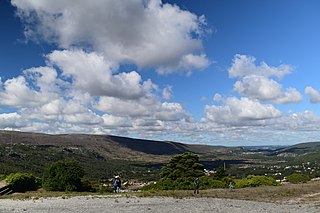
The Iberian Peninsula, also known as Iberia, is a peninsula in southwestern Europe, defining the westernmost edge of Eurasia. It is divided between Peninsular Spain and Continental Portugal, comprising most of the region, as well as a small part of Southern France, Andorra, and Gibraltar. With an area of approximately 583,254 square kilometres (225,196 sq mi), and a population of roughly 53 million, it is the second-largest European peninsula by area, after the Scandinavian Peninsula.
The Iberian Romance, Ibero-Romance or sometimes Iberian languages are a group of Romance languages that developed on the Iberian Peninsula, an area consisting primarily of Spain, Portugal, Gibraltar, Andorra and southern France. They are today more commonly separated into West Iberian and Occitano-Romance language groups.

Psammodromus is a small genus of sand lizards of the family Lacertidae. It has six described species, which are found in European and North African countries next to the Mediterranean.

The Iberians were an ancient people settled in the eastern and southern coasts of the Iberian peninsula, at least from the 6th century BC. They are described in Greek and Roman sources. Roman sources also use the term Hispani to refer to the Iberians.

The Iberian emerald lizard, also known commonly as Schreiber's green lizard, is a species of lizard in the family Lacertidae. The species is endemic to the Iberian Peninsula.

Psammodromus algirus, known commonly as the Algerian psammodromus, the Algerian sand racer, and the large psammodromus, is a species of lizard in the family Lacertidae. The species is endemic to western Europe and northwestern Africa.

Psammodromus blanci, also known commonly as Blanc's sand racer or Blanc's psammodromus, is a species of lizard in the family Lacertidae. The species is endemic to North Africa.

Psammodromus hispanicus, the Spanish psammodromus, is a species of lizard in the family Lacertidae. It is found in France, Portugal, and Spain. Its natural habitats are Mediterranean-type shrubby vegetation, temperate grassland, sandy shores, arable land, pastureland, and rural gardens. It is threatened by habitat loss.

Psammodromus microdactylus, the green psammodromus or small-fingered psammodromus, is a species of lizards in the family Lacertidae. It is endemic to Morocco.

Torrelodones is a municipality in the northwest of the Autonomous Community of Madrid, Spain. It is situated 29 kilometers northwest from the city of Madrid. Because of its location between the Sierra de Guadarrama and the metropolitan area of the capital, it is linked to two districts in Madrid: the agricultural area of Guadarrama and the metropolitan area of Madrid.

Serras de Aire e Candeeiros Natural Park (PNSAC) is a natural park in central west Portugal. It occupies an area of 383.9 km2 (148.2 sq mi) and is the most important repository of limestone formations in Portugal with a variety of geological formations associated with karst topography such as caves, sinkholes, uvalas, poljes, limestone pavements, ponors, among others. It was made a protected area in 1979 with the intend to protect the existing natural aspects and the architectonic and cultural heritage linked to the local populations.

The Iberian System is one of the major systems of mountain ranges in Spain. It consists of a vast and complex area of mostly relatively high and rugged mountain chains and massifs located in the central region of the Iberian Peninsula, but reaching almost the Mediterranean coast in the Valencian Community in the east.
Ichnotropis microlepidota is a species of African lizard in the family Lacertidae. It is commonly called Marx's rough-scaled lizard and is largely found in Angola, Africa. I. microlepidota is a terrestrial lizard and was first discovered at the foot of Mount Moco.

Psammodromus occidentalis is a species of lizards in the family Lacertidae. It is endemic to Western Iberian Peninsula. Before being described as a distinct species in 2012, it was considered as the western lineage of P. hispanicus.

The Sierras of Tejeda, Almijara and Alhama Natural Park is a protected area in the Spanish provinces of Málaga and Granada. It contains the Sierra de Tejeda and Sierra de Almijara mountains. The park is mountainous and is partly covered by pine forests at the lower levels, while typical Mediterranean vegetation is found higher up. There is a large number of endemic species.

Psammodromus manulae is a species of lizard in the family Lacertidae. The species is endemic to Iberia and was previously thought to be a subspecies of the large psammodromus. Its population is stable and it is classified as least concern by the IUCN.















